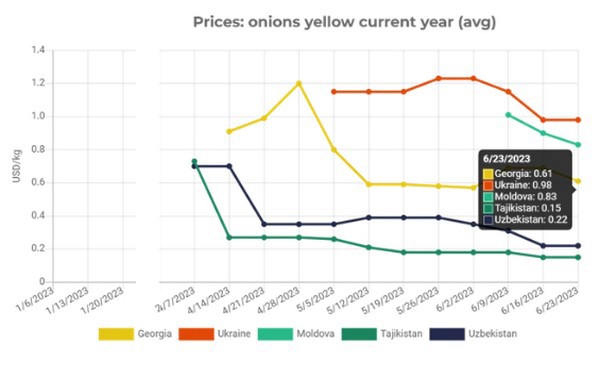According to EastFruit analysts, many countries in the region have dramatically expanded the area under onions under the influence of record prices and strong demand for this crop in the markets of Europe and Asia in the 2022/23 season.
Despite the continued strong demand and high onion export rates from countries such as Uzbekistan, wholesale prices for this vegetable have already dropped to 15-20 cents per kg in Central Asian countries. And this is in the absence on the market of such a large player as Turkey, which has not lifted the ban on onion exports yet.
At the same time, plans are being announced to sharply increase the area under onions, which will be harvested from August 2023 in many countries – both in Central Asia, and in the Caucasus, and in Eastern Europe. It is quite obvious that by that time all countries will have lifted the bans on the export of onions.
We remind you that onions are a crop with a low level of price elasticity. In other words, the level of demand for onions does not depend much on prices, because onions cannot be replaced by anything else in consumption and recipes. Also, even if onions are cheap, people tend not to consume more of them.
This is the key reason for significant price fluctuations in the onion market. After all, if even a slight shortage of onions observed, the prices rise until it becomes profitable to import onions from countries where consumers are simply not able to pay such a high price. A striking example of this year is Egypt, which became the largest supplier of onions to Europe during the winter-spring period, but local consumers could not buy this product because the price for it was too high for them.
But if there is too much onion, then a situation arises that is called “it is not needed even as a gift.” In Ukraine, for example, before the occupation of the country’s production regions by Russian aggressors and the destruction of the irrigation system, situations periodically arose when traders and farmers, after harvesting and storing onions for many months, were forced to throw them away in the spring and summer, because no one needed them at any price.
It is possible that we will see this scenario in 2023/24 in a number of countries. Although in Ukraine, obviously, its repetition will be unlikely, since up to 80% of the commercial production and storage of onions has been destroyed by the Russian terrorists.
For more information: east-fruit.com











